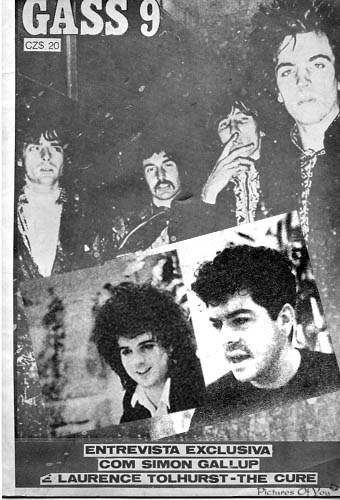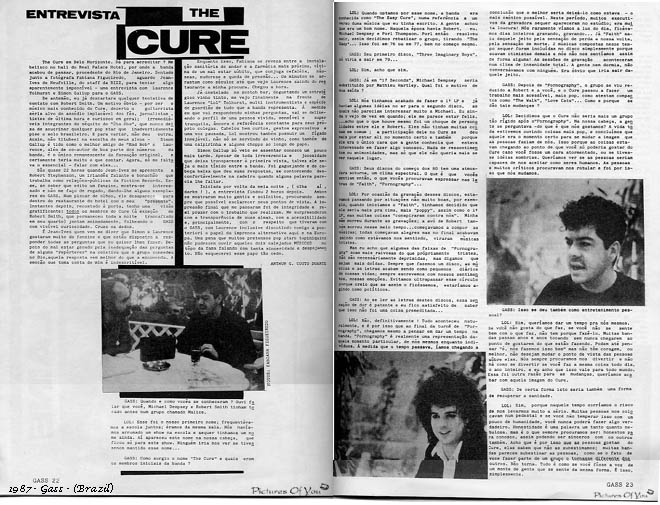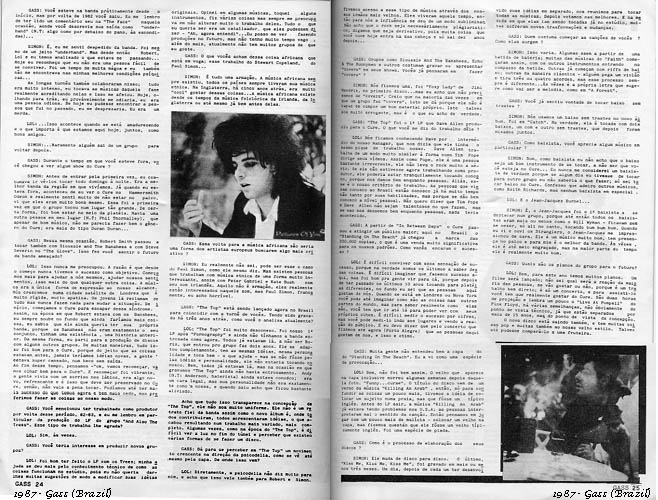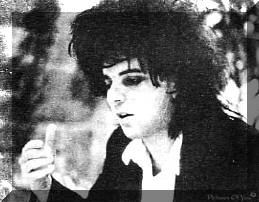


1987
Gass - Fanzine.
(Brazil)
(Translation below)



Gass Fanzine - Exclusive Interview With Simon Gallup and Laurence Tolhurst!
The Cure in Belo Horizonte. Can you believe it? I pinch myself at the hall of Real Palace hotel, where the band is passing through just now, coming from Rio de Janeiro. Iím sitting beside the photographer Fabiana Figueiredo, waiting for the journalist Jean-Yves de Neufville, from Bizz Magazine, to try something apparently impossible Ė an interview with Laurence Tolhurst and Simon Gallup for Gass.
From the start Iíve already given up on any attempt to contact Robert Smith. An obvious reason: as the guitarist is the most known member of The Cure, he certainly would be relentlessly stalked by fans, journalists, groupies and curious people, interested only in annoying any celebrity that may arrive in Brazil. My guess was correct. So I didnít hesitate to choose my other targets: Simon is know as "Mad Bobís" best friend and Laurence is the only original member left, with many stories to tell. Now the only essential thing missing is this Ė that I can manage to talk to them.
Itís almost 10pm when Jean-Yves introduces me to Robert Stephenson, Fictionís public relations, a talkative and kind Irish guy. He gets interested when I say that I edit a fanzine and I promptly give him some numbers. In a second he disappears into the restaurant with my "gift". And seconds later, by the restaurant door, I have a pleasant sight: all the Cure members, but Robert (which stayed all night locked in his room), were having a cheerful dinner, seeing Gass with notable curiosity. I cross my fingers.
Itís Jean-Yves who comes to me and tells that Simon and Laurence had liked the fanzine a lot and are willing to answer to all the questions I might want to ask. After the embarrassment caused due to the questions of some "reporters" at the Rio press conference
* (See note), that response was better than I could imagine. The emotion overwhelms me and is indescribable.Meanwhile, Fabiana was spending her time between the loo and the pharmacy, suffering from headache, cold sweat and low blood pressure... The minutes crawl like centuries until I see Laurence leaving the restaurant to look for me. It was time.
We sat at the bar, by red wine, and I see myself in front of Laurence "Lol" Tolhurst, multi instrumentist and a kind of guardian of all that the band represents. As the interview goes on, his vivid, sensible and very calm personality shows, a constant reference for his band mates. With short hair, expressive gestures and a controlled voice, Lol also proved to have a strong liver, drinking not only the wine, but one caipirinha and some beers along the chat.
Simon Gallup only joined us a little later. At first sight, he may seem irreverent and funny, but he must be the most shy of the band. He stuttered and maintained his head down to answer me, moving with discomfort on his chair looking for appropriate words.
I started the interview around midnight (hello, goths!) and it ended around 2am. Both of them were very gentle, trying whenever possible to make clear their points of view. My final impression was the integrity and true pleasure about their work. I was surprised by their open souls, their accessibility, and most of all, the respect they had with Gass. Laurence even discussed with me later about the role of the alternative press in Brazil and in Europe. Itís a pity that some local pop stars wannabes werenít able to listen to these two experienced MUSICIANS at the top of their careers speaking with so much integrity and simplicity. I wonít forget this chat so soon.
Arthur G. Couto Duarte
* N. Jacira: In which a stupid and grotesque guy named AntŰnio Carlos Miguel, who unfortunately really was a reporter working for Bizz magazine, asked: "Robert, Iíd like to know who is Mary, Simon or Laurence?". Despite the desperate attempt of the Brazilian translator, keeping in silence, of course they understood the meaning of the question and left the room, also canceling the S„o Paulo press conference. A little later this man was fired >:)
(Brazil 1)
Gass: When and how did you meet? Iíve heard that you, Michael Dempsey and Robert Smith were in a previous group called Malice.
Lol: This was our first name; we went to school together, on the same class. We got a show at the school and we didnít even have a name. Then this name came to our heads, but only for this show. No one would have come to see us if we had kept this name...
G: How the name "The Cure" was chosen and who were the first members?
(Brazil 2)
L: When we chose this name, the band was known as "The Easycure", a reference to a verse of a song that I had written. We thought it was a good name. The group had myself, Robert, Michael and Porl Thompson. Then Porl left, and we decided to rename the group, taking out the "the easy"... It was in 1976 or 77, very early on.
G: Your first record, "Three Imaginary Boys", was released only in 1979...
L: Yeah, I guess.
G: When the band recorded "17 Seconds", Michael was replaced by Mattieu Hartley. Why did he leave?
L: We had just made the first LP and there were already some ideas for the second one, but they didnít seem to interest Michael a lot. I still see him once in a while; he looks happy. ...I think that there was a personality shock between him and Robert. They didnít have much in common; Michaelís participation was mainly because he was there at the right time and also because he was the only guy we know that wanted to do something with us. No hard feelings though, he just didnít want to see himself in that place anymore.
G: Your records from the early 80ís have a sombre atmosphere, a ghostly feeling. How did you feel back then, what did you want to express on Faithís and Pornographyís lyrics?
L: When we recorded those albums, we werenít going through a good situation, like when we started to record "Faith", we had decided it would be up, poppier, but a lot of things "conspired" against us. My mother died during the recording sessions; Robertís grandma too... we would compose things, they started out happy, but ended up like we were feeling, turning into sad songs.
But I think that some of the tracks from Pornography sound angrier than properly sad, not depressive either, but mostly hurt. When we make an album, the lyrics and music end up like small life diaries; we always put down our feelings, our emotions. We avoid transposing this circle because otherwise I think we would be acting like politicians.
G: When one reads the lyrics from these albums, the feeling of pain is clear, and Iím pleased to hear that it wasnít premeditate...
L: Definitively not! It all happened naturally, and thatís why, by the end of the Pornography Tour, we thought to give the band a break. This record truly represents that time of our lives as individuals. As the time passed, we were reaching the conclusion to leave the way it was Ė the most chaotic as possible. At that time, none of the record companyís executives even bother to come to the studio: there was too much insanity! We seldom saw the light of day, spent whole days recording, recording... But Faith sounded that way because the feeling of loss around us, the feeling of death. Two songs we composed werenít even included in the album because we thought they were too much optimistic and we didnít feel that way at all! The recording sessions happened in a mood of total insanity. We didnít sleep, we didnít talk to anyone else. It was obvious it would come that way.
G: After Pornography, the group was reduced to you and Robert, making a more accessible work, more pop, like the singles The Walk, The Lovecats... How and why these changes happened?
L: We had decided that The Cure wouldnít be so restrict after Pornography. In our minds, we asked ourselves "what do we like?". Our whole life weíve been listening to pop songs and we came to the conclusion that the moment was perfect to change the image the people had about us. This was because we were getting to the point that you could only like The Cure if you were a tormented person, with dark ideas. We wanted to see if the people would be able to accept us as human beings. The people and lots of critics kept on putting labels on us and thatís why we decided to change.
G: Was this also for personal fun?
L: Yes, we wanted to give ourselves a break. If you donít like what you do, if you feel bad about what you do, thatís no reason to do it. Many bands spend years and years playing and not liking what they do. They can even thing "yeah, we do it well", but they donít have the guts, or donít want to change the peopleís perception about them. We always tried to have fun and thereís no way to get this if you do the same thing day, every year, and I think it works for anybody. This was the other reason to change, we wanted to end that Cure image.
G: It was somehow the way to get sanity back.
(Brazil 3)
L: Yes, because at that time we were under the risk of taking ourselves too seriously. Lots of people put us on a pedestal and if you donít balance it with a bit of humanity, youíll never be able to do something truthful. Honesty is a word somehow tricky, but itís what we seek: to be honest to ourselves and the others. I think thatís why people like The Cure, they know we donít underestimate them; lots of bands seem to do so, like the fact that youíre in a band make you different from the others. It doesnít. Everything is like if you were the voice of lots of people that feel the same way. That simple.
(Brazil 4)
G: (To Simon) You were in the band almost from the beginning, but around 82 you left. I remember reading an article in The Face magazine telling that you had left "underhand"...
S: Yeah, I felt fired from the band. You can say it was underhand, but ever since Robert, Lol and I, weíve been talking about what was going on then... Today I admit I wasnít a person easy to have around. It was a time of much grief but I wasnít in my best, psychologically speaking...
The long tours also had to do with it; everything was too much intense, I used to play those songs really believing them and that affected me. Today, looking back, Iíd probably hate myself, I was a hateful person. If I could find today the person I was, I would despise him. I was shit.
L: ...This happens when we get older and the important thing is that we are here today, together as friends.
S: ...Rarely someone leaves a group then comes back.
G: During the time you were out, did you get to see any Cure shows?
S: Before coming in for the first time, I used to see them play every Sunday night. They were the best band of the place we lived. When I was out of The Cure, I went to see them at Hammersmith Odeon and I really felt bad not to be in the band. They were really good. That was the first time they played in a big venue. In a way, it was good to be in the crowd. There was another guy in my place (Phil Thornalley). He was a good musician, but he didnít seem quite the "Cure kind"; he was more like Duran Duran...
G: By the same time, Robert joined Siouxsie And The Banshees and made The Glove with Steve Severin. Did you fear the group coming to an end?
L: That never worried me. The main reason was that we never pursued success as a goal. We started to help ourselves, to help our feelings more than anything else. The music was the only way of expression for us. We grew in a small town near London that is very rigid, very apathetic. The local kids always complain about everything but never actually do something to change. We started The Cure to escape from that syndrome. So, by the time Robert was with the Banshees, I always knew, deep in my heart, that he still wanted to have his own band, because they werenít his group, they had their own previous story. On the other hand, I went out to produce other bandsí records. This was good for The Cure, because if we kept going that way, we wouldnít have new ideas, we were too tired, facing a dead end.
So time passed and we thought "ok, letís begin again taking a good look at The Cure". And it was thrilling, we kept smiling, it was something new, refreshing and this is something to be preserved. Otherwise itís not worth. We even could be more successful than now, early on, but we did things our own way.
G: You mentioned working as a producer around 82-83, and I remember your work with And Also The Trees. Does it please you?
L: Yeah, sometimes.
G: Would you like to produce new groups?
L: It was good to work with the Trees; my help was mostly in the studio, showing them how things work, because I didnít want to give them too many suggestions and change their original ideas. I gave my opinions about some songs, played some instruments, did a lot of stuff but always concerned not to change their work. I wanted to be the one to catalyze, so they could say "ahh, I see it now" ...I can see myself doing it again, but I donít have much time left, besides, there arenít many groups around that I like.
G: What do you think about this African trend with Stewart Copeland (Police) and Paul Simon...
S: Itís all a fake. African music always existed, all the countries of the world have their own music. In England, five years ago, it was cool to like this kind of stuff... African music has existed since Irish folk songs, Englandís folk songs, even before.
G: Couldnít this attention to African music be a way for European musicians get fresh ideas?
S: I really donít know, this may be Paul Simonís case, as he says. But there are people that work with ethnical music in a very interesting way, like Peter Gabriel and Kate Bush with her Irish sound. Thatís not fake, they are really interested in that particular sound, but Paul Simon, frankly, I think heís horrible.
G: The album The Top was released in Brazil to match your tour (87). Since it was recorded three years ago, how do you see it today?
L: The Top was very disconnected. It was our first album after Pornography and we hadnít the band as connected as now. Everybody was there but Boris, that came in two years ago. He got totally adapted, he has the same ideas, same personality and plays well Ė which helps Ė but if wasnít for his ideas and personality, he wouldnít be playing with us. Well, when we recorded, we still hadnít this connection. Andy Anderson was still with us; he was a nice guy, but his personality wasnít quite like ours, and when he left I think he was relieved.
I think it all shows up in the album, it doesnít sound very uniform. Itís not a good portrait of the band like the new album is (Kiss Me), where everybody brought ideas resulting in a diverse album, more complete. Sometimes, like when we were recording The Top, it was difficult to see the light at the end of the tunnel and realize that there are many ways to make a record.
G: With The Top one can see a growing interest in psychedelia, even from the sleeve. Where does it come from?
(Brazil 5)
L: Psychedelia doesnít mean a lot to me and I think itís the same for Robert and Simon. We had access to this type of music though our older brothers. They lived this, so our influence was subliminal. I donít think rock must be about plagiarism, but letís say derivative, because you hear something today and it only goes out of your mind 10 years from now...
G: Groups like Siouxsie and Echo, among others, normally play covers at their shows. Have you ever thought about this?
S: We did one, Foxy Lady, from Jimi Hendrix, in the first record... but I think we donít need covers. Most of the time, I believe that when a group does this because they canít compose good material. This may sound very arrogant, but thatís what I truly think.
G: The Top was the first record produced by Dave Allen. What do you say about his work?
L: We knew him through our manager, that told us he had a way to work similar to ours. Dave works like video director Tim Pope, heís very irreverent and doesnít take rock too seriously. If he wasnít producing he could even be playing with us, because we get on with him as a person. By the way, this is how we work. We know the people around us that came to Brazil for a long time, and they remain because we have a good relationship more than abilities. Iím not saying that Dave and Tim arenít talented, but if we hadnít this kind of relationship, nothing would have happened.
G: From Inbetween Days, The Cure has reached a bigger audience; here in Brazil there were sold more than 200,000 copies of Standing On A Beach, which is very significant for our standards. How do you deal with success?
L: Itís hard to live with this sensation of success, because we are actually the last people to know. Itís hard to imagine that we are successful here, but it was good for us to come here after 10 years of playing to different audiences. Deep inside I know people here like us. When one is in London or New York, one can only wonder how things are abroad, but you have to go and see with your own eyes how things really are. Itís difficult to measure the success based only in numbers, but you can go to these places and see the audience reaction. I must say, after our first concert here (Porto Alegre), that people like us, and thatís great.
G: A lot of people misunderstood the sleeve of Standing On A Beach. I saw it as a kind of provocation...
L: Well, it wasnít quite like this. The elder man of the photo even died some weeks after the shooting. Funny... curse. The album title comes from a line of Killing An Arab, so, in order to mess things a bit more, we had this idea to bring a guy and put him at a beach, but he had to be a typical Englishman. Before the LP was released, the song was already getting some problems in the USA; the people got wrong the meaning of the song. So we thought to play with a little bit of malice Ė and we did the cover that way.
G: How is the album creation process?
S: It changes from one record to the other. The last, Kiss Me, Kiss Me, Kiss Me, was recorded in about three months. One day, after each one of us had developed our own ideas, we got together to play all the songs. Then we voted for the best ones. And as we played them already at the studio, they were changed and got transformed.
G: Who usually "begin" your songs? How do they come up?
S: It may vary. Some come from the drums; a lot of the songs in Faith started this way, and the other instruments got in along the beat. Other ones had bass riffs; but we have the "classical" way Ė someone gets a guitar, plays two or three chords, but this process is always different... Sometimes the very lyrics suggest how the music is going to be, like in A Forest.
G: Have you ever felt like using a fretless bass?
S: We did, on the new album, for Catch. Actually, itís played with two basses, one with and other without frets and they got mixed together in the end.
G: As a bassist, do you admire any musician?
S: Well, as a bassist, I donít think itís a very good instrument to play, unless you are in The Cure... I never considered myself a real bass player because if I had to play in another group I wouldnít know what to do. I only know how to in The Cure. I confess I admire other musicians like Keith Richards, but no bassist in particular.
L: And Jean-Jacques Burnel... (from The Stranglers)
S: Yeah, he was the first bassist to stand out from a group, because until him everybody was similar to Bill Wyman Ė they didnít move from their place, playing boom-boom-boom. When I saw and heard The Stranglers, Jean made a impression on me from the start. Heís a very good musician, heís got attitude on the stage and I think heís the best in the band. Sometimes I think he gets funny, but most of the time heís really good.
G: Which are The Cureís plans for the future?
L: Well, this year is busy. A film will be released; I donít know the peopleís reaction to it, whether they will like it or not, because itís a very straight-forward piece of work. Itís only a show and to watch it you really have to like The Cure. Itís two hours long and it resembles Live At Pompeii, from Pink Floyd, a bit. There are a lot of similarities, of course not from the technical point of view, as the two are more than 15 years apart, but from the point of view of conception.
The new album is about to be released, it has a lot of pop things and other from our old style. Maybe I can relate it to a fruit basket.
THANKS to: Jacira (Catch A Cure) for the TRANSLATION.
Thanks so very much BB for the scans! :)
